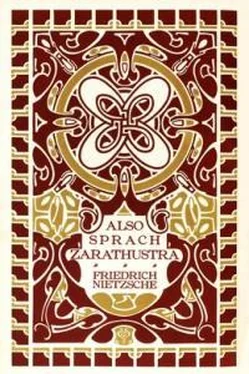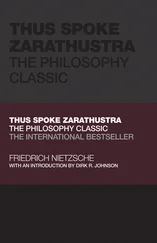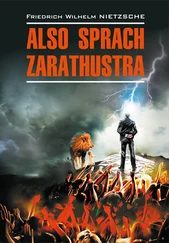Pars. 11, 12.
These deal with Nietzsche's principle of the desirability of rearing a select race. The biological and historical grounds for his insistence upon this principle are, of course, manifold. Gobineau in his great work, "L'Inegalite des Races Humaines", lays strong emphasis upon the evils which arise from promiscuous and inter–social marriages. He alone would suffice to carry Nietzsche's point against all those who are opposed to the other conditions, to the conditions which would have saved Rome, which have maintained the strength of the Jewish race, and which are strictly maintained by every breeder of animals throughout the world. Darwin in his remarks relative to the degeneration of CULTIVATED types of animals through the action of promiscuous breeding, brings Gobineau support from the realm of biology.
The last two verses of par. 12 were discussed in the Notes on Chapters XXXVI. and LIII.
Par. 13.
This, like the first part of "The Soothsayer", is obviously a reference to the Schopenhauerian Pessimism.
Pars. 14, 15, 16, 17.
These are supplementary to the discourse "Backworld's–men".
Par. 18.
We must be careful to separate this paragraph, in sense, from the previous four paragraphs. Nietzsche is still dealing with Pessimism here; but it is the pessimism of the hero—the man most susceptible of all to desperate views of life, owing to the obstacles that are arrayed against him in a world where men of his kind are very rare and are continually being sacrificed. It was to save this man that Nietzsche wrote. Heroism foiled, thwarted, and wrecked, hoping and fighting until the last, is at length overtaken by despair, and renounces all struggle for sleep. This is not the natural or constitutional pessimism which proceeds from an unhealthy body—the dyspeptic's lack of appetite; it is rather the desperation of the netted lion that ultimately stops all movement, because the more it moves the more involved it becomes.
Par. 20.
"All that increases power is good, all that springs from weakness is bad. The weak and ill–constituted shall perish: first principle of our charity. And one shall also help them thereto." Nietzsche partly divined the kind of reception moral values of this stamp would meet with at the hands of the effeminate manhood of Europe. Here we see that he had anticipated the most likely form their criticism would take (see also the last two verses of par. 17).
Par. 21.
The first ten verses, here, are reminiscent of "War and Warriors" and of "The Flies in the Market–place." Verses 11 and 12, however, are particularly important. There is a strong argument in favour of the sharp differentiation of castes and of races (and even of sexes; see Note on Chapter XVIII.) running all through Nietzsche's writings. But sharp differentiation also implies antagonism in some form or other—hence Nietzsche's fears for modern men. What modern men desire above all, is peace and the cessation of pain. But neither great races nor great castes have ever been built up in this way. "Who still wanteth to rule?" Zarathustra asks in the "Prologue". "Who still wanteth to obey? Both are too burdensome." This is rapidly becoming everybody's attitude to–day. The tame moral reading of the face of nature, together with such democratic interpretations of life as those suggested by Herbert Spencer, are signs of a physiological condition which is the reverse of that bounding and irresponsible healthiness in which harder and more tragic values rule.
Par. 24.
This should be read in conjunction with "Child and Marriage". In the fifth verse we shall recognise our old friend "Marriage on the ten–years system," which George Meredith suggested some years ago. This, however, must not be taken too literally. I do not think Nietzsche's profoundest views on marriage were ever intended to be given over to the public at all, at least not for the present. They appear in the biography by his sister, and although their wisdom is unquestionable, the nature of the reforms he suggests render it impossible for them to become popular just now.
Pars. 26, 27.
See Note on "The Prologue".
Par. 28.
Nietzsche was not an iconoclast from predilection. No bitterness or empty hate dictated his vituperations against existing values and against the dogmas of his parents and forefathers. He knew too well what these things meant to the millions who profess them, to approach the task of uprooting them with levity or even with haste. He saw what modern anarchists and revolutionists do NOT see—namely, that man is in danger of actual destruction when his customs and values are broken. I need hardly point out, therefore, how deeply he was conscious of the responsibility he threw upon our shoulders when he invited us to reconsider our position. The lines in this paragraph are evidence enough of his earnestness.
Chapter LVII. The Convalescent.
We meet with several puzzles here. Zarathustra calls himself the advocate of the circle (the Eternal Recurrence of all things), and he calls this doctrine his abysmal thought. In the last verse of the first paragraph, however, after hailing his deepest thought, he cries: "Disgust, disgust, disgust!" We know Nietzsche's ideal man was that "world–approving, exuberant, and vivacious creature, who has not only learnt to compromise and arrange with that which was and is, but wishes to have it again, AS IT WAS AND IS, for all eternity insatiably calling out da capo, not only to himself, but to the whole piece and play" (see Note on Chapter XLII.). But if one ask oneself what the conditions to such an attitude are, one will realise immediately how utterly different Nietzsche was from his ideal. The man who insatiably cries da capo to himself and to the whole of his mise–en–scene, must be in a position to desire every incident in his life to be repeated, not once, but again and again eternally. Now, Nietzsche's life had been too full of disappointments, illness, unsuccessful struggles, and snubs, to allow of his thinking of the Eternal Recurrence without loathing—hence probably the words of the last verse.
In verses 15 and 16, we have Nietzsche declaring himself an evolutionist in the broadest sense—that is to say, that he believes in the Development Hypothesis as the description of the process by which species have originated. Now, to understand his position correctly we must show his relationship to the two greatest of modern evolutionists—Darwin and Spencer. As a philosopher, however, Nietzsche does not stand or fall by his objections to the Darwinian or Spencerian cosmogony. He never laid claim to a very profound knowledge of biology, and his criticism is far more valuable as the attitude of a fresh mind than as that of a specialist towards the question. Moreover, in his objections many difficulties are raised which are not settled by an appeal to either of the men above mentioned. We have given Nietzsche's definition of life in the Note on Chapter LVI., par. 10. Still, there remains a hope that Darwin and Nietzsche may some day become reconciled by a new description of the processes by which varieties occur. The appearance of varieties among animals and of "sporting plants" in the vegetable kingdom, is still shrouded in mystery, and the question whether this is not precisely the ground on which Darwin and Nietzsche will meet, is an interesting one. The former says in his "Origin of Species", concerning the causes of variability: "…there are two factors, namely, the nature of the organism, and the nature of the conditions. THE FORMER SEEMS TO BE MUCH THE MORE IMPORTANT (The italics are mine.), for nearly similar variations sometimes arise under, as far as we can judge, dissimilar conditions; and on the other hand, dissimilar variations arise under conditions which appear to be nearly uniform." Nietzsche, recognising this same truth, would ascribe practically all the importance to the "highest functionaries in the organism, in which the life–will appears as an active and formative principle," and except in certain cases (where passive organisms alone are concerned) would not give such a prominent place to the influence of environment. Adaptation, according to him, is merely a secondary activity, a mere re–activity, and he is therefore quite opposed to Spencer's definition: "Life is the continuous adjustment of internal relations to external relations." Again in the motive force behind animal and plant life, Nietzsche disagrees with Darwin. He transforms the "Struggle for Existence"—the passive and involuntary condition—into the "Struggle for Power," which is active and creative, and much more in harmony with Darwin's own view, given above, concerning the importance of the organism itself. The change is one of such far–reaching importance that we cannot dispose of it in a breath, as a mere play upon words. "Much is reckoned higher than life itself by the living one." Nietzsche says that to speak of the activity of life as a "struggle for existence," is to state the case inadequately. He warns us not to confound Malthus with nature. There is something more than this struggle between the organic beings on this earth; want, which is supposed to bring this struggle about, is not so common as is supposed; some other force must be operative. The Will to Power is this force, "the instinct of self–preservation is only one of the indirect and most frequent results thereof." A certain lack of acumen in psychological questions and the condition of affairs in England at the time Darwin wrote, may both, according to Nietzsche, have induced the renowned naturalist to describe the forces of nature as he did in his "Origin of Species".
Читать дальше











